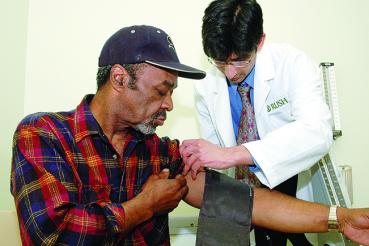We all hope that the older adults in our life will be able to enjoy their independence for as long as possible. The only problem is that this sentiment can get in the way of properly planning for the possibility that loved ones may need a little more assistance or may need someone to speak on their behalf in the future.
"There's a tremendous resistance culturally against planning for the possibility of something bad happening, especially a medical crisis or death," says the Reverend Clayton L. Thomason, JD, MDiv, the Bishop Anderson Professor of Religion and Medicine at Rush.
"I think this can be looked at differently," he says. "It's really about connecting with people you care about and discussing how you would like things to be handled in the case of a crisis. These caring conversations should give you a feeling of being heard and respected, while helping to put things in order to avoid burdening loved ones."
Starting the conversation
Conversations about what level of support may be needed in the future are easier to have when someone is relatively healthy and independent. This is a time when the idea seems further away and more abstract and hopefully less threatening.
You shouldn't wait to have these talks. "I like to think of advanced care planning like voting in Chicago: It should be done early and often," says Thomason. This advice applies to adults of all ages. It's never too early to start letting your wishes be known.
From these conversations you'll be able to express what's most important to you and how you would like to be supported. Having a say in how things will be taken care of can go a long way to reducing your anxiety.
Expressing your values
"These conversations are great for exploring what your values are and how you would like to see them carried out," Thomason says. "You should share your thoughts with as many of your family and friends as possible, so that there's no question what your wishes are."
One way to do this is with a living will. A living will is basically a list of treatments that you do or do not want in the event of a terminal illness when you're unable to speak for yourself. This is a helpful document that you should give to your doctor and share with your loved ones.
"It's even more important to have a durable power of attorney for health care," says Thomason. "This allows someone you choose to make decisions for you should you be unable to make them for yourself."
I like to think of advanced care planning like voting in Chicago: It should be done early and often.
Getting things in order
You'll want to work with your loved ones to get things in order so that important papers and documents are easy to find if something happens.
Of course, you want someone who will honor your privacy. The person you're working with doesn't need to know all details of your finances; he or she just needs to know where to find any important documents should you need help because of a medical crisis.
Some tips for being prepared for a crisis:
- Put all the important documents in one place, especially documents about insurance, real estate, investments and other income.
- Tell someone whom you have great trust where these documents can be found in case of a crisis.
- Give written permission to your doctors and lawyers, who they can speak to about your medical and legal situation.
Reviewing your priorities
"I think it's also important that people review their wishes as time passes or when they have life changes, like a divorce or a new medical diagnosis" says Thomason.
You can think of them as the five Ds:
- You reach a new decade
- You experience a death of a family member or friend
- You divorce
- You receive a new diagnosis
- You have a significant decline in your quality of life as measured by the Activities of Daily Living scale
Depending on the circumstances, some of these events can significantly change your plans.
Help with your homework
For those who may be asked to lend their support during a medical crisis, it's a good idea to do a bit of research so that you have a good idea of what caring for your loved one could entail.
You can contact your local department of aging; they can give you some insight into what other people have experienced along with information about the scope of services that their agency offers. For the city of Chicago, you can contact Chicago's Senior Services agency. Outside the city limits, you can contact the Illinois Department on Aging.
Some other agencies for nearby states include the following:




